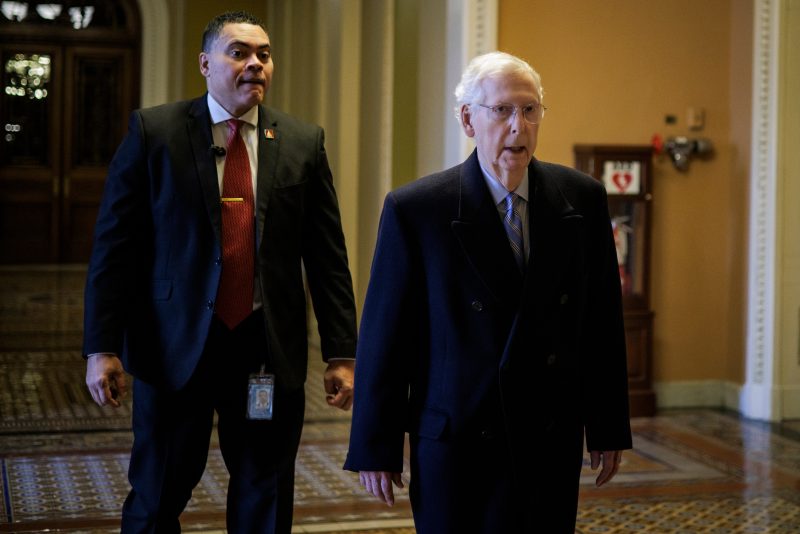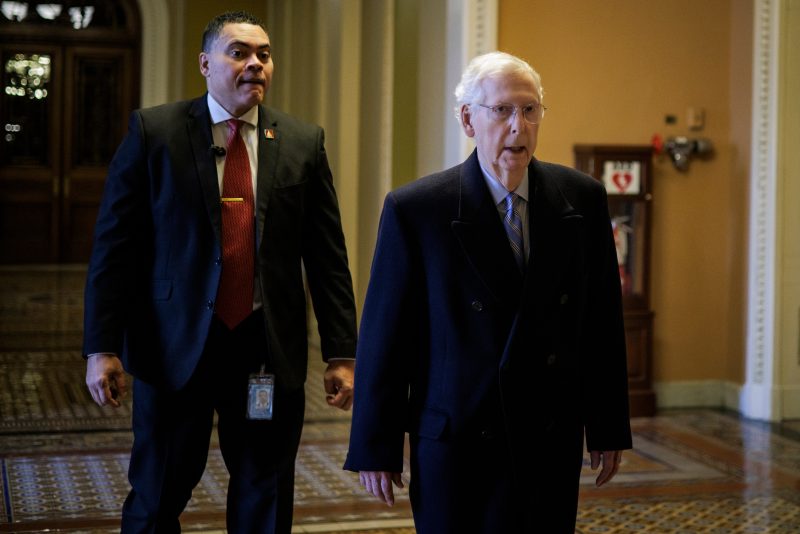
Eighteen Republican senators joined Democrats on Sunday in voting to advance a $95 billion national security bill that contains funds for Ukraine and Israel, putting the bill on a path to pass the chamber early this week in what could be seen as a rebuke to former president Donald Trump’s recent comments deriding the NATO alliance.
House Speaker Mike Johnson (R-La.) is unlikely to take up the legislation if it ultimately passes the Senate, after many hard-right lawmakers have drawn a line on sending funds to Ukraine as it fends off a Russian invasion.
Sen. Thom Tillis (R-N.C.) said an “obvious choice” to improve the bill’s chances in the House would be for Democrats to use a discharge petition to circumvent Johnson’s will. Sen. Markwayne Mullin (R-Okla.) said discussions are being held with House lawmakers to follow such a path.
The legislation, which also contains more than $9 billion in humanitarian aid and additional funds for the Indo-Pacific region including Taiwan, had been held up in months-long negotiations to attach bipartisan border reforms to it, which most Republicans voted to block last week after Trump signaled his displeasure with the effort.
Trump again loomed over the proceedings after some Republicans distanced themselves from his remarks at a campaign rally Saturday, when he said he would disregard the NATO treaty among the United States and its allies.
Trump said that he told a president of a NATO country that he “would not protect” their country if Russia attacked it, because their country was not spending enough on defense. “In fact, I would encourage [Russia] to do whatever the hell they want,” Trump said he told that president.
Sen. Mark R. Warner (D-Va.), chair of the Intelligence Committee, called the comments “frankly frightening” and said they would encourage Russian President Vladimir Putin as he wages war on Ukraine. Sen. Chris Murphy (D-Conn.) said Trump was “signaling” to Putin that he would “hand” him Ukraine if he becomes president.
“Everything Trump is saying is guaranteeing that this war continues, at least through this next election,” Murphy said.
Senators reaffirmed their commitment to NATO and to sending the $60 billion in assistance to Ukraine on the Senate floor. Ukraine is not a member of the treaty, but many NATO member countries have banded together to help the European nation fend off Russia’s invasion.
“I know it’s become quite fashionable in some circles to disregard the global interests we have as a global power,” Senate Minority Leader Mitch McConnell (R-Ky.), who has been pushing his conference to deliver the Ukraine aid, said on the Senate floor Sunday. “To lament the commitment that has underpinned the longest drought of great power conflict in human history. This is idle work for idle minds, and it has no place in the United States Senate.”
Sen. Lisa Murkowski (R-Alaska) told reporters it was uncalled for to suggest we throw NATO allies “to the Russian wolves.”
Several Republicans said they didn’t believe Trump was suggesting he would support an attack on a NATO ally but was simply encouraging them to pay their share. “Any attack on a NATO ally would have devastating consequences for American men and women who would be deployed to defend them,” Tillis said.
“I don’t think he’s going to withdraw from NATO,” Sen. Lindsey Graham (R-S.C.), a close ally of Trump’s, said Sunday. “I think he’s trying to make a point. I’m not worried about it at all.”
Sen. Rand Paul (R-Ky.) said he would slow the foreign aid bill’s passage as much as possible, which is delaying the final vote. “We don’t have $100 billion to give anyone,” Paul said, referencing the U.S. debt.
Sen. Bernie Sanders (I-Vt.) was the only member of the Democratic caucus to vote against the aid Sunday, citing the high civilian death toll and humanitarian disaster unfolding in Gaza.
Absent the agreement of all senators to move forward more quickly, the legislation needs to be voted on again Monday evening, with 60 hours more of debate, before it would make it to a vote on final passage likely early Wednesday morning.
GOP senators have been deeply divided on how to proceed on the Israel and Ukraine aid package, with some critics arguing that McConnell led them into a political box canyon where Democrats have claimed the political edge on border security after the GOP defected from the border deal they initially demanded.
A vocal faction of McConnell critics has grown louder over the past several days, with a handful even calling for his ouster, as Senate Republicans gathered in meeting after meeting arguing about the uncomfortable political situation in which they find themselves.
But on Sunday, the vote was 67-27 in favor of moving forward with the legislation; 18 Republicans now support the package stripped of border security measures after Mullin flipped his no vote from last week to support it.
In addition to Mullin, McConnell, Tillis and Murkowski, other Republicans backing the aid bill are Sens. Shelley Moore Capito (W.Va.), John Thune (S.D.), Bill Cassidy (La.), Roger Wicker (Miss.), Susan Collins (Maine), Dan Sullivan (Alaska), Todd Young (Ind.), Mitt Romney (Utah), Joni Ernst (Iowa), John Neely Kennedy (La.), Mike Rounds (S.D.), Chuck Grassley (Iowa), John Cornyn (Tex.) and Jerry Moran (Kan.).

